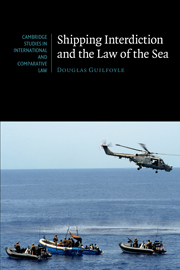Book contents
- Frontmatter
- Contents
- Foreword
- Preface
- Acknowledgements
- List of abbreviations
- Table of treaties and other international agreements
- Table of cases
- PART I General principles
- PART II Interdiction and maritime policing
- PART III The general law of interdiction
- 10 Interdiction: modalities and international law standards
- 11 National jurisdiction and immunities during interdictions
- 12 International responsibility and settlement of claims
- 13 General conclusions: a law of interdiction?
- Select bibliography
- Index
- CAMBRIDGE STUDIES IN INTERNATIONAL AND COMPARATIVE LAW
11 - National jurisdiction and immunities during interdictions
Published online by Cambridge University Press: 11 September 2009
- Frontmatter
- Contents
- Foreword
- Preface
- Acknowledgements
- List of abbreviations
- Table of treaties and other international agreements
- Table of cases
- PART I General principles
- PART II Interdiction and maritime policing
- PART III The general law of interdiction
- 10 Interdiction: modalities and international law standards
- 11 National jurisdiction and immunities during interdictions
- 12 International responsibility and settlement of claims
- 13 General conclusions: a law of interdiction?
- Select bibliography
- Index
- CAMBRIDGE STUDIES IN INTERNATIONAL AND COMPARATIVE LAW
Summary
Introduction
What happens if during an interdiction a boarding party member breaches the criminal law of the flag state? The question is more than hypothetical. In Chapter 6 it was noted that within NAFO at least one Portuguese master had laid a criminal complaint alleging that a Canadian inspector's actions in searching for logbooks aboard a Portuguese vessel breached Portuguese law. To resolve such situations one must first determine the law governing state organs' extraterritorial conduct. Ordinarily a state may place law-enforcement officials aboard a foreign vessel in two scenarios: either upon the high seas with flag-state consent (unless a permissive rule allows interdiction); or within another state's territorial sea with that territorial sovereign's consent. In either case the consent of the state having otherwise exclusive criminal enforcement jurisdiction (‘the receiving state’) is required to extend any jurisdictional competence to the boarding state. Three questions follow. First, is the boarding state entitled at international law to apply its own law to conduct discovered aboard? Second, what are the boarding state's obligations under the receiving state's law? That is, must the boarding state follow or implement receiving-state law and are boarding-state officials subject to or immune from that law? Third, what are the boarding state's obligations regarding any breach of the receiving state's law by its boarding party? Some interdiction treaties address these matters, but often in a partial or incomplete manner. One must therefore examine applicable rules of general international law.
- Type
- Chapter
- Information
- Shipping Interdiction and the Law of the Sea , pp. 295 - 323Publisher: Cambridge University PressPrint publication year: 2009



